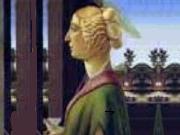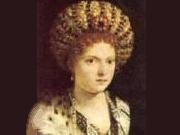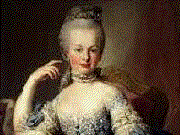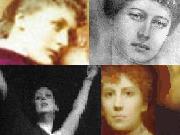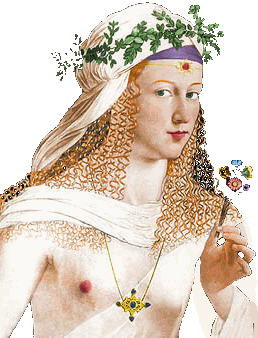Womania
| Lucrezia Borgia |
| Table of Contents |
|
Books on eBay ???
Why not!
Click the picture below!
Enter the BOOKS category and
Find fun and bargains!


So, how Lucrezia’s life was manipulated?
By the age of eleven, Lucrezia had been betrothed twice. Indeed, for twelve years, she had been fiancče by proxy with a Spanish nobleman, don Caspar from Procida, but her father broke off the promise when he thought about being able to gain more from the wedding with somebody else.
After becoming Pope Alexander VI, Rodrigo married her off to Giovanni Sforza (a cousin of Il Moro and his younger brother Cardinal Ascanio Sforza), thus establishing an alliance with the powerful Milanese family. Giovanni had been a widower since the death of his wife—Magdalena Gonzaga, sister of Francesco Gonzaga, Duke of Mantua.
The marriage was by proxy, and for four months after her marriage, until the arrival of her new husband in Rome, Lucrezia lived in a handsome palace next to the Vatican with the Pope’s new mistress, Guilia Farnese, whose husband was conveniently away in the Pope’s service.
The house was next to the Vatican palace, and Alexander could easily come and go, visiting his daughter and mistress unobserved. A formal wedding ceremony was held shortly after Sforza’s arrival, with 500 ladies attending the bride, led by the Pope’s mistress. A sumptuous wedding banquet was held while the actors performed a comedy about libertines, mistresses and pimps—a work by the ancient Roman playwright Plautus. It was a scandalous event, but not much more opulent than many Renaissance celebrations.
After spending two years as the Countess of Pesaro, located in the region where the Pope had sent his son-in-law on a military expedition, Lucrezia returned to Rome with her husband. She served as her father’s hostess at diplomatic receptions.
Soon, Giovanni Sforza’s presence in the papal court meant nothing because the Borgias no longer needed the Sforzas. New political alliances made the link to the Sforza family no longer of significance to the pope. When she learned that her brother Cesare hatched a plan to murder her husband, Lucrezia warned Giovanni, who fled Rome at once. This may have been a ploy on the part of Cesare and Lucrezia to drive her husband away.
In any case, Alexander made a quick action, and asked Cardinal Ascanio Sforza, to get his cousin to agree to a divorce because of non-consummation of the marriage. Giovanni refused, and turned to Il Moro, the de-facto head of the powerful Milanese family, who, however, wanted no quarrels with the Pope, and knowingly suggested the defense of Giovanni—to prove his manhood, Giovanni would sleep with Lucrezia while observed by members of the Borgia and Sforza families. Giovanni rejected the proposal, saying that the whole thing turned out too ridiculous.
Giovanni even counterattacked, accusing Lucrezia of incest with her father and her two brothers—Cesare and Giovanni, the second Duke of Gandia.
The Pope used the only valid argument for annulment, the non-consummation of the marriage, and he offered his son-in-law all of his daughter’s dowry. The head of the Sforza family threatened to withdraw his protection if his cousin refused the Pope’s offer. Giovanni Sforza had no choice, and signed a confession of impotence and the documents of annulment before witnesses.
So much for husband number one. He was actually quite fortunate to escape with his life intact.
During the bargaining over the divorce, Lucrezia retired to a nearby convent. Her only communication with her father during her enforced stay was through the messages brought by a young chamberlain, Perotto. She became fed up with the proceedings, which gradually turned into a pathetic comedy. During this period, she also heard of the distressful assassination of her brother—Giovanni, the second Duke of Gandia.
During all these weary and lonely days, her only respite was to meet the carefree, cheerful youth, Perotto. Before long, therefore, she took a fancy to this young man, and mutual feelings developed into a fleeting yet passionate romance.
Six months later, pregnant from a liaison with Perotto, Lucrezia participated in a ceremony in which Vatican judges attested that she was intacta, that is, a virgin. Giovanni Sforza gave sworn testimony to this fact, and the divorce was pronounced final.
Cesare, discovering his sister’s pregnancy, became furious. He made a run at the young Perotto with drawn sword, stabbing him as he knelt before the papal throne, splashing Perotto’s blood on his father. Perotto survived the attack, but was thrown into prison. A few days later, a contemporary observer reported that Perotto “had fallen into the Tiber against his will”. Six days later, Perotto’s body was fished out of the river, along with that of Lucrezia’s chambermaid, who, supposedly, had facilitated the affair.
The child from this liaison was born in secret, and, when he was finally recognized, was called the infans Romanus. He was named Giovanni, and had ever since become a somewhat mysterious figure in the Borgia history. This child did not surface until three years after his birth, when Alexander declared that he was indeed the infans Romanus, the child of Rome, and was the offspring of Cesare and an unknown woman. This first papal bull was followed by a second, which acknowledged that the child was the son of the pope himself, even though the pope would have been sixty-seven at the time of the child’s conception.
The purpose of the papal bulls was to give Alexander the excuse to name the young Giovanni the heir to the duchy of Nepi, a property important to the Borgia family. This subterfuge to legitimize the infans Romanus simply led people to assume that the boy was the child of Lucrezia and Alexander, or of Lucrezia and Cesare.
A certain historian wrote that Lucrezia insisted on the two papal bulls because she didn’t know which of her two lovers, her father or her brother, had actually fathered the child.
The rumor of incest had started when Giovanni—Lucrezia’s first husband—attacked his former in-laws, and had ever since persisted to this day. Though there existed no concrete evidences nor sound reasoning for incest, the Borgias had, as a whole, created such a favorable situation as the orgiastic festivities held at the court in the jubilee year of 1500, in which fifty Roman harlots coupled with fifty palace servants, competing for the “best performance” award while Cesare, Lucrezia and the Pope watched with mirth.

Knowing what kind of party was held at the palace, the Romans assumed, quite naturally, that the Borgias also took part in the debauchery. Besides, their enemies didn’t overlook this opportunity to debase the powerful Borgias. Accordingly, some came to believe that the incestuous indulgence had produced the infans Romanus.
More than likely, however, the infans Romanus was the fruit of Lucrezia’s reckless fling with Perotto. The hapless child, Giovanni, was passed from guardian to guardian, eventually ending up with Lucrezia in Ferrara as “her half brother”.
The unfortunate Giovanni never inherited any titles, and, after a lifetime of serving as a minor functionary in the courts of the Vatican and France, died relatively unknown in 1548.
| Copyright Akira Kato About this author:
|

|
Why don’t you get FREE tools?
 Sign up and enjoy the various free services.
Sign up and enjoy the various free services.
Membership is completely free.
As of this writing, there are 2.7 million
registered members.
Here are some facts about Bravenet Web Services:
- World Ranking by Media Metrix shows that Bravenet is number 280 for January 2002. That is up 20 spots since November 2001!
- Top Rating from Tucows! “Bravenet is by far one of the best
web page tool providers out there. If you want fast, reliable
service that is easily customizable without an overload of ads,
Bravenet is the way to go. Even if it is your first time using one
of these tools, they provide a list of resources that will help you
use your tools. I give them five cows!”
- Suite 101 awarded Bravenet the “Personal Web Page Design #1 Top Site”. Five star rating!
- Internet Magazine has rated Bravenet #1 for Top Tried
& Tested Site Improvements!



